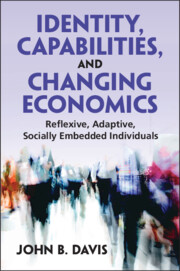Book contents
- Identity, Capabilities, and Changing Economics
- Identity, Capabilities, and Changing Economics
- Copyright page
- Dedication
- Contents
- Tables
- Boxes
- Preface
- Acknowledgments
- Part I The Failed Pathway and Exit Strategies
- 1 Objectivity in Economics and the Problem of the Individual
- 2 The Untenability of the Unembedded Homo economicus
- 3 From the “Reconciliation Problem” to an Individuality Reconstruction Problem
- Part II Building a Socially Embedded Individual Conception
- Part III Value and Subjectivity
- References
- Index
1 - Objectivity in Economics and the Problem of the Individual
from Part I - The Failed Pathway and Exit Strategies
Published online by Cambridge University Press: 11 January 2024
- Identity, Capabilities, and Changing Economics
- Identity, Capabilities, and Changing Economics
- Copyright page
- Dedication
- Contents
- Tables
- Boxes
- Preface
- Acknowledgments
- Part I The Failed Pathway and Exit Strategies
- 1 Objectivity in Economics and the Problem of the Individual
- 2 The Untenability of the Unembedded Homo economicus
- 3 From the “Reconciliation Problem” to an Individuality Reconstruction Problem
- Part II Building a Socially Embedded Individual Conception
- Part III Value and Subjectivity
- References
- Index
Summary
Chapter 1 provides philosophical foundations for the arguments of this book in discussing the issue of scientific objectivity in economics. It criticizes a closed science, “view from nowhere” conception of economics, and defends an open science, “view from somewhere” conception of economics as an objective science. The first conception is ascribed to current mainstream economics, is associated with its principle practices – reductionist modeling, formalization, limited interdisciplinarity, and value neutrality – and has as its foundation the abstract Homo economicus conception. Two problematic consequences of these practices are value blindness regarding the range and complexity of human values; fatalism regarding human behavior in employing a tenseless rather than tensed representation of time. In contrast, the principle practices of an open science, “view from somewhere” conception of economics as a science – complexity modeling, mixed methods, strong relationships to other disciplines, and value diversity – provide the foundations of a socially and historically embedded individual conception. The chapter closes with discussion of the question: Might mainstream economics be a science bubble?
Keywords
- Type
- Chapter
- Information
- Identity, Capabilities, and Changing EconomicsReflexive, Adaptive, Socially Embedded Individuals, pp. 3 - 26Publisher: Cambridge University PressPrint publication year: 2024

